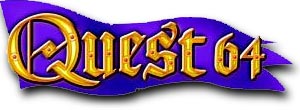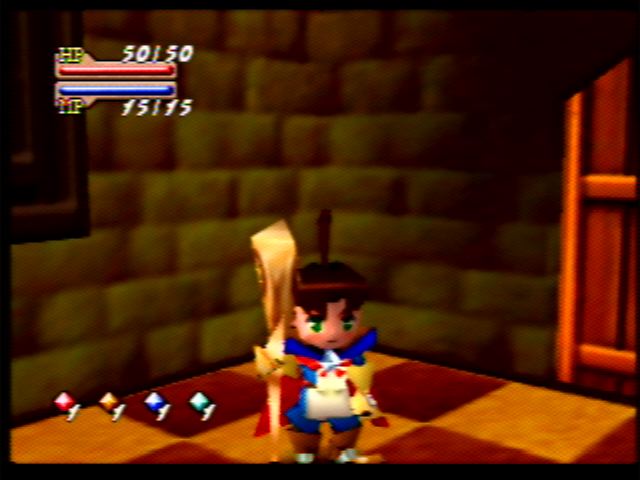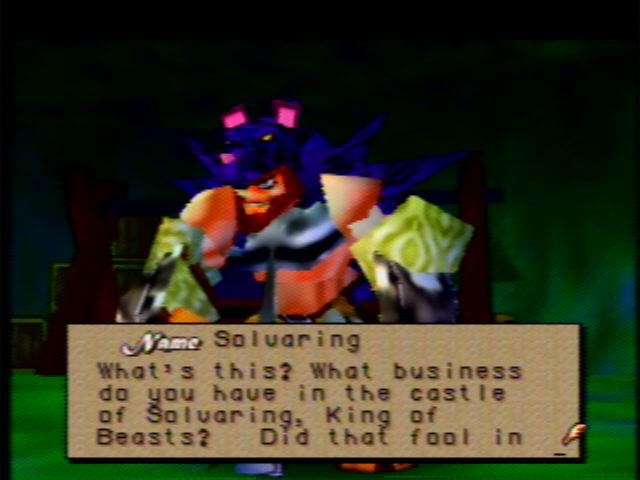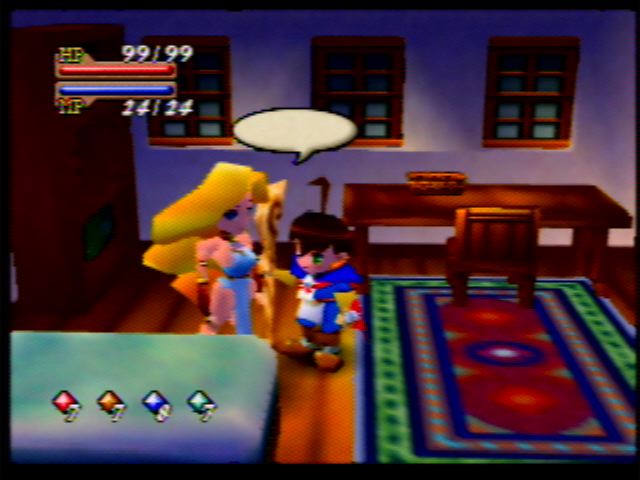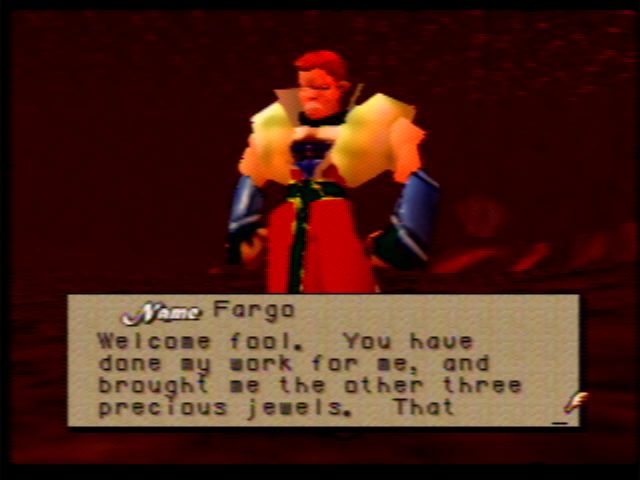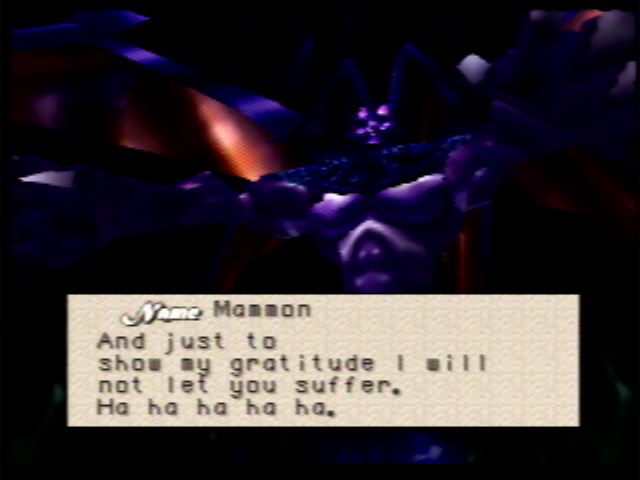
 |
|
Vinegar to a man dying of thirst; a laxative to a man starving to death; N'Sync CDs to a Nirvana fan; the works of L. Ron Hubbard to a comparative religion professor; Quest 64 to an N64 owner in mid-'98. Pick the least disagreeable torture from the list above, and if you settled on the last one, you're wrong.
Truthfully, it's difficult to decide exactly how to fault Quest 64 as a game; its manifold sins are evenly divided between the game's childish outlook, its halfhearted attempts to be an action RPG, the sheer banality of what's being presented, and the occasional flashes of potential mixed in with all the dross. What isn't difficult to nail down is the game's painfully bad timing: in the middle of 1998, the N64 had been out for over a year, but RPGs of any kind for the system were completely missing. Numerous third party companies were beginning to release solid games for the PSX, and there were rumors of true greatness on the N64's horizon (Zelda:OoT would be released before the end of the year). But at the time, all N64 owners had were a handful of good platformers, sports games, and Goldeneye. Add into that mix Quest 64, a profoundly underwhelming game lacking everything that's traditionally made RPGs interesting, and you have a game that heaps insult upon injury like dumping Don Rickles on top of Chernobyl. Quest 64 is the story of Brian, one of the least imposing heroes the genre has ever seen. Admittedly, this in and of itself isn't necessarily damning - the boy-becomes-a-man theme is just as much a part of adventure games as slaying dragons and damsels in distress. Nor are the particulars of Brian's quest that exceptional: mystic item gets stolen by dark forces, evil spreads throughout the land, your father, a powerful magician, goes missing in an attempt to set things right, and it's up to you to succeed where he has failed, etc, etc. In fact, one could almost praise the game for getting so many of the genre's cliches out of the way so quickly for newcomers.
In practice, Brian is a terrible character because he never changes; instead of boy-becomes-a-man we have boy-stays-a-boy, because he's just as much a twerp at the end of the game as at the beginning. Even calling Brian a character may be stretching things, since he never speaks during the course of the game. Chrono pulled this off with a cool hair style, a snarky grin and enough attitude to fill a Ramones album, but all Brian has is a wooden staff taller than he is, a pathetic red cape, and two disturbingly large, empty eyes. It's tempting to ease off on the game because it is so obviously an introductory title, and it's easy to shrug off a lack of substance in something designed for 7 year-olds. If everything in the game gets drawn in broad, colorful, larger than life strokes, if the the villains are obviously Bad Guys without being overly menacing, if the women are beautiful and admiring in a completely platonic way, if the whole world is completely helpless until the hero comes along, if there's nothing even remotely approaching a subplot or moral complexity... well, what more did anyone expect from a kid's game?
No, what dooms Quest 64 is how poorly it executes even those limited goals. Brian's father is the nominal reason for the epynonymous Quest in the first place, and clues about him are generously strewn throughout the game. However, when Brian finally encounters him there's nearly no indication that this is his father, and no closure of any kind is forthcoming. Villains and supporting characters appear out of nowhere and disappear just as fast, which begs the question of why anyone bothered programming them in the first place. Ditto the dozens of NPCs, each with a different name but a nearly-identical message to declare, and the day-night cycle which does nothing but cause a palette shift from one muddy tone to another. Even the game's final villain feels like an afterthought, since it could have been anyone from Captain Crunch to Lenin's ghost pulling the strings of this farce. Meanwhile, the game's shapely henchwoman (well, shapely by Quest 64 standards, which isn't saying much) reveals how duplicitous she's been just in time to have a change of heart two minutes later. Gameplay is similarly questionable. There are two ways to make a game playable for small children who lack the experience to beat a challenging scenario - the first is to start out simple and become more difficult as time goes on, gradually teaching them more sophisticated skills and techniques until they've reached a sufficient level of mastery to legitimately win the game. Quest 64 takes the second approach, which is to make the game beatable by anyone, no matter how poorly they play, as long as they play it long enough. Rather than gaining experience and strength by winning battles, Brian literally gains strength by being hit a lot - the more damage the player takes, the greater his HP becomes. Because of this, it's difficult to progress through the game in any traditional fashion; the player simply fights, dies, fights again, eventually muddling through the game's monotonous, indistinguishable corridors until the dungeon is complete, and they can move on.
On the other hand, there's a potentially interesting magic system in Quest 64, had anyone bothered to take it as seriously as it deserved. Spells are based on a standard four element system, and are accessed by combinations of the four C-buttons. Had these spells represented actual combinations of elements, perhaps with corresponding attack/defense attributes, magic might have been a fun, interesting, integral part of the game - as it is, 90% of the spells are utterly useless, and combat largely consists of beating on enemies with your staff, followed by the occasional heal spell. Brian can also move back and forth from enemies, which allows him to occasionally dodge enemy spells and always escape from battle when needed. Still, even this raises questions as to why the game's not an action RPG in the first place, especially since combat pauses indefinitely while enemies slowly haul themselves from one location to another.
As for graphics... well, from time to time it's interesting to imagine a parallel reality where the N64 was fully supported, and companies like Konami and Capcom developed the system's capabilities beyond squishy, colorful polygon blobs. Even in our reality, every so often, Q64 manages to put up something on the screen that might have been decent in another developer's hands. Occasionally castles and environments look interesting, if seen in the right light, and the game manages even broader horizons than Zelda 64... if you ignore the fact that said horizons are square, and seem to have a vanishing point about a mile away. However, the graphics are largely just dull and repetitive, and don't get much help from the constant, headache-inducing camera pans. Sound is completely unremarkable for an SNES game, which makes it about par for the N64, unfortunately. If there's anything good to say about Quest 64, it's that time heals all wounds. Nintendo loyalists can look forward to a significantly more diverse lineup of games with the Gamecube, and the N64 has a paltry few good titles that should entertain retro gamers enough to keep them far away from Quest 64. There's simply no longer any need for anyone to pick this game up in the first place, or struggle through it because there's nothing else to play. Brian's quest supposedly ends with peace slowly returning to his homeland; likewise, joy should hopefully soon return to those who might have thought themselves forever scarred by this abomination of an RPG. Retrospective by Chris Jones, GIA. |
|
|||||||||||||||||||||||||||||||||||||||||||||||
